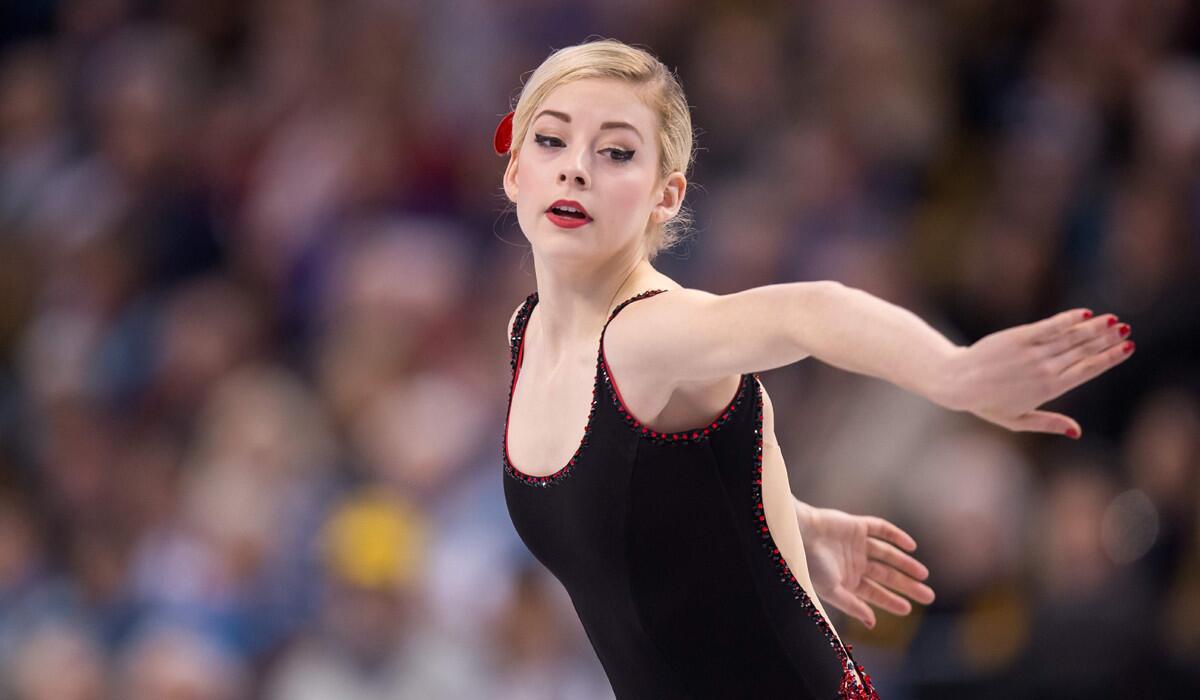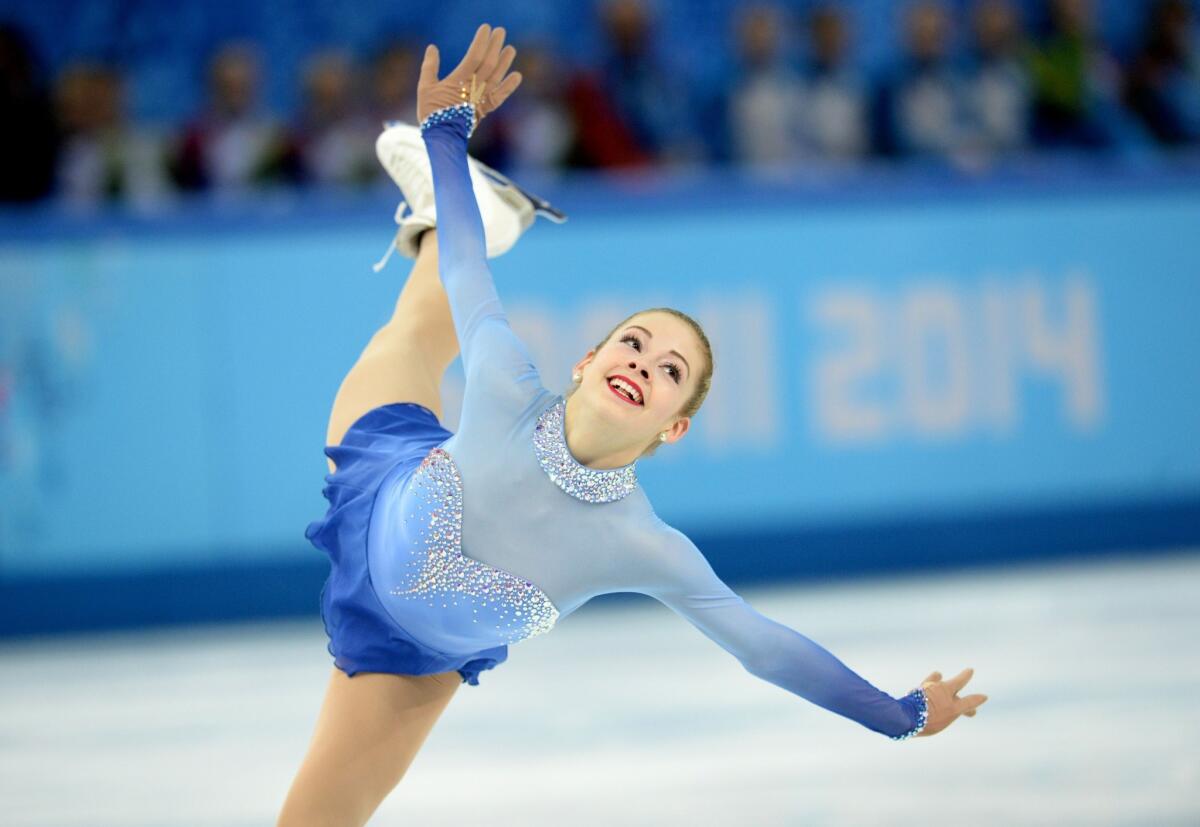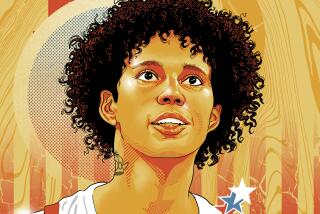Column: Figure skater Gracie Gold makes a difficult but smart decision

- Share via
What matters most now is that figure skater Gracie Gold gets well and can enjoy her life, healthy in mind and body, even if that means she doesn’t compete again this season or at the Winter Olympics in February in Pyeongchang, South Korea.
Gold, a two-time U.S. champion who contributed to a team bronze medal at the 2014 Sochi Olympics, candidly admitted Friday she’s in treatment for depression, anxiety and an eating disorder. She had previously announced she had stepped away from the sport to seek help, but not until Friday did she specify the demons she’s fighting.
Gold, 22, also said she won’t compete in the Grand Prix series, events that are crucial in Olympic seasons because skaters can make adjustments to their programs based on judges’ reactions.
“It saddens me deeply to sit out this Grand Prix Series, but I know it is for the best,” she said in a statement released by her publicist.
The saddest part is that Gold is hardly alone.
In September, Sochi team gold medalist Yulia Lipnitskaya of Russia retired from the sport at 19, citing a long battle against anorexia. American Jennifer Kirk, who won the world junior title in 2000 and finished third at the U.S. championships in 2004, was frank about her own eating disorders. Many other skaters have struggled to find a suitable balance in a sport that demands strength for jumps and, especially among female competitors, rewards the appearance of delicacy. An extra ounce of weight on your body could mean a slower rotation of a spin, slightly less height on a jump, a less-pleasing look that judges would punish by awarding lower scores. It can become a constant and vexing battle.
It was that and more for Gold, who often has been compared to Grace Kelly for her cool, blonde beauty and was a mesmerizing performer when she put her artistry and athleticism together. Gold won the U.S. title in 2014, won a team bronze medal at Sochi and finished fourth in the women’s singles event, and rallied to win the national championship again in 2016. She led the field after the first phase of the 2016 world championships but dropped to fourth, triggering a string of erratic performances. She left Southern California to train in Michigan early this year.
She’s a fighter and she’s incredibly strong.
— Adam Rippon, trainer

Los Angeles-based Ashley Wagner, the U.S. women’s champion in 2012, 2013 and 2015, is a rival of Gold’s but has become a friend. Asked last month about Gold’s struggles — when it was known only that Gold planned to step away from the sport for a while — Wagner rightfully praised Gold for being courageous enough to seek help.
“As a human you want someone to feel good and it’s beyond being an athlete. At this point, it’s about how she is as a person. I think the fact that she’s able to acknowledge that she needs to get back to a level sense of self, it takes a lot of guts,” Wagner said during the U.S. Olympic media summit in Park City, Utah.
“In figure skating it is so easy to tie body-image issues into the ideal body that we need to have, and that line gets very blurred. I have always had a very healthy relationship with my body and I’ve always seen it as a tool. And so for me, I don’t weigh myself. I go off of what feels good. I know when I’m in shape and I know when I’m out of shape. And I think that for Gracie, taking a step back and actually taking time to focus on herself as an athlete, that is one of the hardest decisions to make. It really just is a statement as to how strong that girl is, and people don’t give her enough credit for that.”
Adam Rippon, who trains with Wagner, is aware of the pressure Gold faces.
“I think it’s really hard as an athlete that you have to share your ups and downs and not being perfect. But I think for someone like her, a high-profile athlete stepping away, it shows that she’s adult,” Rippon, the 2016 men’s national champion, said during the media summit.
“It’s a very mature decision. It’s brave. It’s scary. But it’s smart, and if she feels it’s something she needs to do, as her friend I support her 100%.”
Rippon was confident in Gold’s resilience.
“She’s a fighter and she’s incredibly strong,” he said. “I not only admire her but I really have so many commendations for what she’s done in her career so far. I think she has so much more to give and I think she’s an incredible athlete and an incredible person and she’s going to discover how strong she really is.”
It would be wonderful if Gold decides she’s healed and eager to compete again and enters the U.S. championships in January to chase an Olympic berth. If she decides to move on, may she be happy and healthy in whatever else she does. There’s more than a trophy or a medal at stake here.
Follow Helene Elliott on Twitter @helenenothelen
More to Read
Go beyond the scoreboard
Get the latest on L.A.'s teams in the daily Sports Report newsletter.
You may occasionally receive promotional content from the Los Angeles Times.






